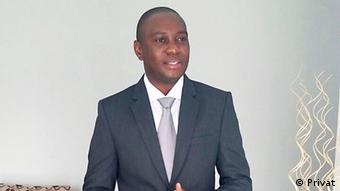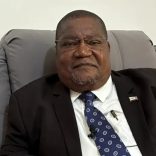Mozambique: Is Ossufo Momade looking for someone to blame for Renamo's downfall?
Mozambique: Would constitutional changes represent democratic backsliding?

The consensus reached between Mozambique’s President Nyusi and the leader of the largest opposition party, Renamo, seems to accommodate the interests of both parties, but the changes to the constitution it entails raises questions.
DW Africa spoke to lawyer Vicente Manjate, an attorney and human rights and constitutional rights expert, about the consensus reached in the peace negotiations between the Mozambican Liberation Front (Frelimo) government and the Mozambican National Resistance (Renamo)
DW Africa: Is it correct to say that the intention behind this constitutional change is nothing more than a plan ‘made by two’?
Vicente Manjate (VM): It is made by two, because it is the two presidents of the largest national parties that have reached agreement. But without doubt, before or even after the proposal is submitted in a format appropriate to the Assembly of the Republic, one can expect debate involving other sectors in society. But, for now, although it is made by two, [it is understood that] the Head of State also represents all Mozambicans, as well as being the president of Frelimo negotiating with the leader of another party. I believe it is made by two, but then they are two leaders, although this is a working commission.

DW Africa: For example, the indication of a mayor by the president instead of by direct election, as is the case presented so far, is seen as a step backwards in the country’s democratisation, because, for example, it excludes the possibility of independent candidates.
VM: I believe that this proposal will be one of the few that will not happen. This change is the designation of the mayor of a municipality and it cannot be agreed by either by the Head of State [and also not by the leader] or Renamo, nor by the members of parliament pure and simple. In order to change this form of designation it is necessary that there be a change of the Constitution. However, since direct and personal universal suffrage for the appointment of the mayor is one of the material limits to the revision of the Constitution, the proposal for a law to change the Constitution [in the matters covered by these limits] must be submitted to a referendum before being presented to the Assembly of the Republic. This means that this particular aspect should be taken to a referendum if it is to be implemented. And, in view of the fact that the proposals for constitutional change must be submitted to the Assembly of the Republic at least 90 days before the date of the beginning of their debate, I do not believe that this approval can be obtained by October.
DW Africa: The proposed nomination of the Governor by the President and the accountability of the Governor to the Provincial Assembly seems to allow for a balance of power between Frelimo and Renamo, at least at this time. But for this to happen the Provincial Assembly must also have the power, which up to now in the Mozambican context has not happened. The Assemblies do not have that much power…

VM: That’s true, they don’t. It will have an impact on the terms in which the political and electoral disputes that we experience have allowed for this balance of forces. However, this may at some point give rise to some degree of ungovernability in the provinces.
On the one hand, we do not yet have [information on what will be] the powers of the provincial Governors. We do not know what will change in concrete in their competencies. We do not know if the provincial Governor will continue to be the representative of the Head of State at local level and with all the powers that he had [up to now]. It seems not, because there will be a Secretary of State. In the meantime, we do not have the statute of this Secretary of State and the concrete competencies he will have.
At this precise moment [from what we know] what comes across is that the provincial Assembly will eventually no longer be approving the annual plans, the social economic plans of the provincial governments and, in the meantime, it is going to have a supervisory power. And if we consider that the Provincial Government implements the centrally defined plans, the question is what they [Provincial Assemblies’ members] will be supervising [monitoring] and what powers will they have over the provincial Governor or the provincial Government if they only oversee a plan that they do not even approve.
There is, therefore, a depletion of the powers of the Provincial Assembly. Notwithstanding, they are to acquire the power to be able to indicate the Governor. And another question arises: is this proposal binding on the president? And what if the president refuses to accept the person who has been proposed by the Provincial Assembly? What happens then? What happens if he refuses two, three or four times? Does this Assembly dissolve? There are a number of issues that still need to be improved in order for us to assess the regularity of this government.












Leave a Reply
Be the First to Comment!
You must be logged in to post a comment.
You must be logged in to post a comment.